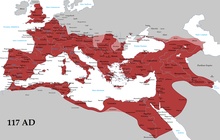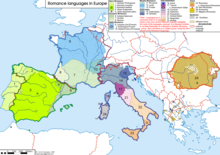From Wikipedia, the free encyclopedia
Lating-gí (Lingua Latina), he̍k-chiá La-teng-gí, Lat-teng-gí[2], Lia̍p-teng-gí[3], sī chi̍t-chióng kó͘-chá Roma-lâng kóng ê gí-giân. Roma Thian-chú-kàu Kàu-hoē chit-má tī chèng-sek to͘-ha̍p iû-goân ēng Lating-gí, só͘-í i sī Vaticano ê koaⁿ-hong gí-giân.
| Lating-gú | |
|---|---|
| lingua Latīna | |
 | |
| Hoat-im | [laˈtiːna] |
| Goân-chū kok-ka | |
| Sú-iōng tē-khu | Originally in the Italian Peninsula, and the zone of influence of the Roman Empire. Today, it is official in Vatican City, although Italian is the working language there. |
| Bîn-cho̍k | Latins, Romans |
| Era | 7th century BC Pang-bô͘:Endash 18th century AD |
| Gí-hē |
Indo-European
|
| Bûn-jī hē-thóng | Latin alphabet |
| Koaⁿ-hong tē-ūi | |
| Koaⁿ-hong gí-giân |
|
| Koán-lí ki-kò͘ |
|
| Gí-giân tāi-bé | |
| ISO 639-1 |
la |
| ISO 639-2 |
lat |
| ISO 639-3 |
lat |
| Glottolog |
impe1234lati1261 |
| Linguasphere |
51-AAB-aa to 51-AAB-ac |
 Map indicating the greatest extent of the Roman Empire under Emperor Trajan (c. 117 AD) and the area governed by Latin speakers (dark red). Many languages other than Latin were spoken within the empire. | |
 Range of the Romance languages, the modern descendants of Latin, in Europe. | |
Kho-ha̍k kap i-ha̍k ū chiâⁿ chē jī-sû sī Latin-gí. Hiān-tāi ê gí-giân mā ū chiâⁿ chē sī ùi Latin-gí lâi--ê, chhin-chhiūⁿ Se-pan-gâ-gí, Portugal-gí, Hoat-gí, Italia-gí kap Romania-gí.
Seamless Wikipedia browsing. On steroids.
Every time you click a link to Wikipedia, Wiktionary or Wikiquote in your browser's search results, it will show the modern Wikiwand interface.
Wikiwand extension is a five stars, simple, with minimum permission required to keep your browsing private, safe and transparent.